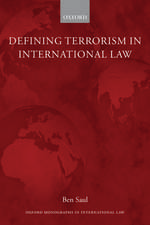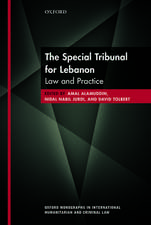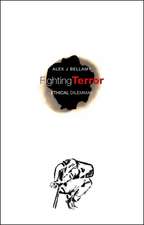Risk and the War on Terror
Editat de Louise Amoore, Marieke de Goedeen Limba Engleză Hardback – 30 mai 2008
Risk and the War on Terror offers an interdisciplinary set of contributions which debate and analyze both the empirical manifestations of risk in the War on Terror and their theoretical implications. From border controls and biometrics to financial targeting and policing practice, the imperative to deploy public and private data in order to ‘connect the dots’ of terrorism risk raises important questions for social scientists and practitioners alike.
- How are risk technologies redeployed from commercial, environmental and policing domains to the domain of the War on Terror?
- How can the invocation of risk in the War on Terror be understood conceptually?
- Do these moves embody transformations from sovereignty to governmentality; from discipline to risk; from geopolitics to biopolitics?
- What are the implications of such moves for the populations that come to be designated as ‘risky’ or ‘at risk’?
- Where are the gaps, ambiguities and potential resistances to these practices?
| Toate formatele și edițiile | Preț | Express |
|---|---|---|
| Paperback (1) | 435.59 lei 43-57 zile | |
| Taylor & Francis – 30 mai 2008 | 435.59 lei 43-57 zile | |
| Hardback (1) | 1113.95 lei 43-57 zile | |
| Taylor & Francis – 30 mai 2008 | 1113.95 lei 43-57 zile |
Preț: 1113.95 lei
Preț vechi: 1358.47 lei
-18% Nou
Puncte Express: 1671
Preț estimativ în valută:
213.15€ • 223.15$ • 176.37£
213.15€ • 223.15$ • 176.37£
Carte tipărită la comandă
Livrare economică 07-21 aprilie
Preluare comenzi: 021 569.72.76
Specificații
ISBN-13: 9780415443234
ISBN-10: 0415443237
Pagini: 296
Ilustrații: 5 b/w images
Dimensiuni: 156 x 234 x 18 mm
Greutate: 0.59 kg
Ediția:New.
Editura: Taylor & Francis
Colecția Routledge
Locul publicării:Oxford, United Kingdom
ISBN-10: 0415443237
Pagini: 296
Ilustrații: 5 b/w images
Dimensiuni: 156 x 234 x 18 mm
Greutate: 0.59 kg
Ediția:New.
Editura: Taylor & Francis
Colecția Routledge
Locul publicării:Oxford, United Kingdom
Public țintă
Postgraduate and UndergraduateCuprins
Foreword: Rusing Risk Bill Maurer. Introduction: Governing by Risk in the War on Terror Louise Amoore and Marieke de Goede Part 1: Risk, Precaution, Governance 1. Taming the Future: The Dispositif of Risk in the War on Terror Claudia Aradau and Rens van Munster 2. Spatial Imaginaries: Economic Globalisation and the War on Terror Wendy Larner 3. The State of Preemption: Managing Terrorism Risk through Counter-Law Richard V. Ericson Part 2: Crime, Deviance, Exception 4. Choosing our Wars, Transforming Governance: Cancer, Crime, and Terror Jonathan Simon 5. Risk, Preemption and Exception in the War on Terrorist Financing Marieke de Goede 6. Consulting, Culture, the Camp: On the Economies of the Exception Louise Amoore Part 3: Biopolitics, Biometrics, Borders 7. Fast Capitalism/Slow Terror: Cushy Cosmopolitanism and its Extraordinary Others Matthew Sparke 8. Putting the Migration-Security Complex in its Place William Walters 9. Embodying Risk: Using Biometrics to Protect the Borders Charlotte Epstein Part 4: Risk, Tactics, Resistances 10. Border Hacks: The Risks of Tactical Media Rita Raley 11. Subverting Discourses of Risk in the War on Terror Susan Bibler Coutin 12. Conclusion: Risk and Imagination in the War on Terror Mark B. Salter
Notă biografică
Louise Amoore is Lecturer in Political Geography in the Department of Geography at Durham University, UK.
Marieke de Goede is Senior Lecturer at the Department of European Studies of the University of Amsterdam, The Netherlands.
Marieke de Goede is Senior Lecturer at the Department of European Studies of the University of Amsterdam, The Netherlands.
Recenzii
"This anthology's broad coverage of the relationship of risk to the war on terror's proliferation of surveillance is extraordinary. The work of this excellent group of scholars is innovative and compelling." - Michael Shapiro, University of Hawaii, USA
"Three key themes run through this excellent book, all of which present central challenges to the concept of a liberal democracy. These are: the exponential increase in state access to personal data; the use of that data as a tool for risk analysis by the state and, thirdly, the entry of the precautionary principle (widely supported in environment circles) into policing and counter-terrorism policy fields. The essays included in this volume cover the field fully and intelligently. This book provides an outstanding contribution to literature on the changing nature of liberal governance in the 21st century. It should be required reading for policy makers and analysts as well as all politics students." - Elspeth Guild, Radboud University Nijmegen, the Netherlands
"This book is a wonderfully thought-provoking and insightful analysis of the genesis and negative effects of risk technologies that have been deployed in connection with the War on Terror and the links of these to other large-scale social phenomena such as globalization. In highlighting these negative effects, the book is sometimes frightening, while also emphasizing the failures, gaps and political resistance that are evident in the deployment of these risk technologies. Risk and the War on Terror is filled with theoretically and empirically fascinating new contributions to our understanding of this crucially important topic." - Tony Porter, McMaster University, Canada
'This anthology's broad coverage of the relationship of risk to the war on terror's proliferation of surveillance is extraordinary. The work of this excellent group of scholars is innovative and compelling.' - Michael Shapiro, University of Hawaii, USA
'Risk and the War on Terror is filled with theoretically and empirically fascinating new contributions to our understanding of this crucially important topic.' - Tony Porter, McMaster University, Canada
"Three key themes run through this excellent book, all of which present central challenges to the concept of a liberal democracy. These are: the exponential increase in state access to personal data; the use of that data as a tool for risk analysis by the state and, thirdly, the entry of the precautionary principle (widely supported in environment circles) into policing and counter-terrorism policy fields. The essays included in this volume cover the field fully and intelligently. This book provides an outstanding contribution to literature on the changing nature of liberal governance in the 21st century. It should be required reading for policy makers and analysts as well as all politics students." - Elspeth Guild, Radboud University Nijmegen, the Netherlands
"This book is a wonderfully thought-provoking and insightful analysis of the genesis and negative effects of risk technologies that have been deployed in connection with the War on Terror and the links of these to other large-scale social phenomena such as globalization. In highlighting these negative effects, the book is sometimes frightening, while also emphasizing the failures, gaps and political resistance that are evident in the deployment of these risk technologies. Risk and the War on Terror is filled with theoretically and empirically fascinating new contributions to our understanding of this crucially important topic." - Tony Porter, McMaster University, Canada
'This anthology's broad coverage of the relationship of risk to the war on terror's proliferation of surveillance is extraordinary. The work of this excellent group of scholars is innovative and compelling.' - Michael Shapiro, University of Hawaii, USA
'Risk and the War on Terror is filled with theoretically and empirically fascinating new contributions to our understanding of this crucially important topic.' - Tony Porter, McMaster University, Canada
Descriere
Written by leading scholars in the field, this book offers the first comprehensive and critical investigation of the specific modes of risk calculation that are emerging in the so-called war on terror.






















